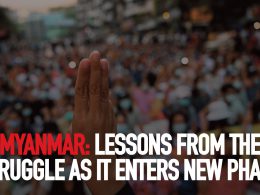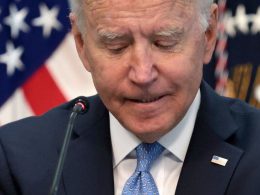The EU’s crisis and extreme austerity measures has opened up the potential for right-wing extremist and racist parties to become the largest polling parties in several countries in the European elections, in May 2014. The Front National in France and the Dutch PVV recently formed an alliance to which they invite other right-wing populist parties.
Both the Front National, led by Marine Le Pen and Geert Wilders’ PVV are at 20-25% in the polls and the largest parties in France and the Netherlands. Two weeks ago, they declared their ambition to form a larger alliance.
Among the parties invited to join are Vlaams Belang in Belgium, the Lega Nord in Italy, Austria’s FPÖ and in Sweden the Democrats. A summit with party leaders was held in Stockholm a month ago, including Le Pen, Filip Dewinter (VB), Hans-Christian Strache (FPÖ) and Jimmie Åkesson (SD).
The Danish People’s Party, the German AfD (’Alternative for Germany’) and UKIP in Britain are among the parties that have, so far, declined Le Pen and Wilders’ invitation.
The increased social and economic crisis in Europe has given the racist and right-wing populist parties new opportunities. In power, the established right-wing and social democratic parties pushed through drastic austerity measures hitting the living conditions of working people.
Symbol of austerity
The entire EU has, during the crisis, even more than before become a symbol of attacks on living standards and rights. In a large opinion poll held across Europe, last September, only 30% said they had a positive view of the EU. Twenty years ago, 70% were positive, according to Gallup Europe, which notes that “the European project has never been so unpopular”.
The French National Front and its allies want to emerge as the only truly ’anti-EU parties’ in the elections next May. European elections tend to see right populist parties that gain votes from the discontented usually achieve their best performances.
Since the EU has further restricted the movement of refugees, not least in the Mediterranean, the extreme right has benefited. Asylum-seekers are portrayed as a burden in crisis-ridden countries, by both establishment parties and the extreme-right. This hides the fact that billions goes to the banks, not to refugees.
The extreme-right wants to exploit the massive discontent with the EU. At the launch of the new right-wing alliance, Geert Wilders promised to “fight the monster called Europe.” Marine Le Pen said that the EU is a system that “enslaved our diverse peoples.” Both parties want to leave the euro.
That they are stepping up criticism of the EU does not mean that racism is no longer an issue. Geert Wilders, PVV leader, is one of Europe’s leading public Islamophobes and he demands that the Koran is banned. Le Pen has lately incited against Roma people and other immigrants from Bulgaria and Romania.
No longer extreme?
Yet in recent years sections of the media and ’mainstream’ parties have started to regard the populist right as no longer extremist. When the FPÖ joined the Austrian government, in 2000, the EU made limited protests, such as not participating in certain meetings. But nothing similar happened when the PVV, ten years later, joined the Dutch government. Nor when the Progress Party, last month, gained important posts – finance and immigration ministers – in the Norwegian government (Norway has very close ties with the EU, even if the country is not a member).
One reason that the far right parties are more acceptable is that the old right-wing parties have taken up some of their policies. Both former French President Nicolas Sarkozy and Italy’s Berlusconi, mass-deported Roma people and branded them as criminals. As the economic and social crisis deepens, the established parties turn both to populism and more authoritarian methods. When the Hungarian government party, Fidesz – which is part of the international political group involving conservative parties in Western Europe – adopted several of the opposition extreme right Jobbik’s policies, this acted to strengthened Jobbik.
Another reason is that the right wing parties need coalition partners or supporters in parliament to form a government. The Danish People’s Party was a support party to the right government (2001-2011) and managed to squeeze through very tough rules against immigration, which the social democrats retained when they came to power. The established French right is now discussing openly cooperation with the National Front. In Finland, there is speculation that the next government could be collaboration between the Centre Party and the Finns (previously the True Finns). Indeed, the racist parties are putting pressure on the old parties. Wilders said at the press conference with Le Pen that the two parties could “get the Europhile elite singing a different tune.”
Polished images
The far right parties now wishing to form an alliance have polished their public images. They call themselves “patriotic” but do not want parties such as Golden Dawn in Greece, Jobbik in Hungary and some other more or less openly Nazi parties in Eastern Europe to join.
The European Alliance for Freedom (EAF) has existed for years. Its Chair-person is Franz Obermayr from the FPÖ in Austria, and Marine Le Pen is Vice Chair. Sweden’s most notorious islamophobe, Kent Ekeroth, represents the Sweden Democrats.In February 2011, the EAF received their first grant from the European Parliament, 372,000 euros. In total, they have received over 750,000. And if EAF, after the 2014 elections, manage to form a parliamentary group, with at least 25 members from seven countries, they can get over a million euros per year.
There are also several other groups of right-wing parties in the European Parliament. The MELD (Movement for a Free and Democratic Europe) includes the Danish People’s Party, the Lega Nord and the Slovak National Party. The EFD (Europe of Freedom and Democracy) is led by UKIP. All of these groups receive substantial grants.
Paving the way for even worse
The right-wing populist parties who receive support in the elections, and may be even invited to form governments, can pave the way for even worse violent racist and Nazi parties. Right-wing populists want to participate in government, but because the policies are unpopular they then lose support. So it was for the PVV, when the party was in the Dutch government in 2011-12. When the extreme right party, LAOS, sat in the Greek government, its support collapsed and went to Golden Dawn.
Nationalism and right-wing populism is different in different countries, partly due to traditions and, of course, depending on what kind of resistance they meet. For the Dutch PVV, Islamophobia is a key part of their ideas and the party received contributions from pro-Israel organizations. The French Front National has more classic neo-fascist and anti-Semitic roots. The Austrian FPÖ and the Belgian Vlaams Belang are neo-liberal parties and the National Front is clearly conservative. The Norwegian Progress Party has a very populist tradition, with demands for more resoruces for health care etc.
There alliances, as well as their parties, are under constant pressure to split or break-up. A previous attempt to gather the extreme right parties collapsed due to Alexandra Mussolini, the fascist dictator’s granddaughter, treating the East European parties as less than worthy.
But the ongoing economic crisis and EU and government austerity policies give the populist right new opportunities. They are now brought together on the basis of right-populist criticism of the EU, with most of them using Islamophobia as the main racist argument. Of course, they are also attracted by the possibility of gaining substantial financial contributions from the EU.
What can be done?
EU politicians are concerned that the extreme right can get 25-30% in elections next year but they provide no alternative for working people. Despite their words, the ’old’ parties will turn to more openly racist and right-wing populist politics, such as banning the headscarf and street ’begging’ etc., to turn public attention away from the ongoing economic crisis and mass unemployment.
The Left and workers’ movement must draw completely different conclusions. The EU is a tool for big business and banks to attack the public sector and trade union rights. This is not cooperation in the interests of workers and youth, but a “union for the one percent”. However, a breakup of the EU, on the basis of capitalism, would probably mean even bigger attacks to ’improve’ national “competitiveness “.
A workers’ Europe is needed. The crisis must be answered with struggle and a socialist programme for jobs and real prosperity. Workers and poor across Europe have common class interests and have to fight together. The joint general strike in mainly Spain and Portugal, on 14 November last year, shows the way forward. Mass anti-cuts struggles and the struggle to build new, mass workers’ parties providing a socialist alternative will be the main way to fight back against the growth of the extreme-right.
The struggle also requires a high anti-racist profile. Workers’ organisations and the Left must mobilise against all attempts at racist division and organise self-defence against racist violence.
A socialist programme must be based on Europe today. Tear up the austerity policies! For a plan of work for everyone; take the banks and corporations into public ownership. This is the only policy that can seriously undermine support for right-wing and racist parties.












